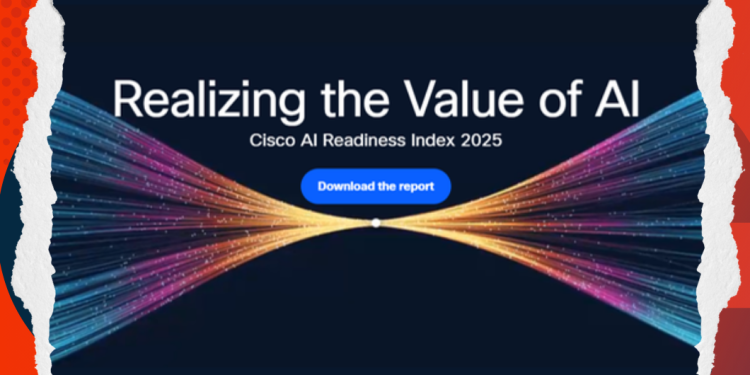New research reveals that an overwhelming 92% of organizations across the Emirates are planning to deploy AI agents within their operations, showing a significant shift from traditional automation to intelligent systems that can work independently alongside human employees.
According to Cisco’s third annual AI Readiness Index 2025, which surveyed 8,039 senior business leaders across 30 countries, UAE companies are leading a global transformation where AI moves beyond simple chatbots to become autonomous decision-makers that can plan, execute, and deliver results without constant human oversight.
UAE Organizations Sprint Ahead in AI Agent Adoption
While 83% of companies globally plan to deploy AI agents, UAE organizations are outpacing the worldwide average. 41% of UAE companies expect these AI systems to work directly alongside their employees within the next 12 months.
This adoption reflects what Cisco identifies as mounting pressure for measurable returns. The study shows 86% of UAE respondents report stronger demands to demonstrate AI value over the past six months. Three-quarters now classify AI as a top priority within their IT spending, with 64% having established concrete strategies for AI implementation.
“We are witnessing a pivotal transition beyond traditional chatbots to advanced agentic systems that can independently execute complex tasks and drive significant value,” said Abdelilah Nejjari, Managing Director of Cisco Gulf and Levant.
Infrastructure Investment Surge Matches AI Ambitions
Over half (51%) of organizations plan new data center capacity investments within 12 months to support growing computational demands. This infrastructure expansion aligns with the global trend where data center debt has skyrocketed 112% to $25 billion in 2025, driven primarily by AI adoption needs.
The infrastructure focus addresses a critical challenge identified in the report, which is AI Infrastructure Debt. This concept describes the accumulation of technical shortcuts, deferred upgrades, and inadequate architecture that becomes expensive over time. Warning signs include rising costs relative to value delivered, recurring delays in moving from pilot to production, and resource strain from talent and infrastructure gaps.
Financial Returns Drive Adoption Momentum
UAE organizations are not just investing in AI for future potential, but they’re already seeing returns. The research shows 69% of UAE companies report gains in profitability, productivity, and innovation from their AI deployments. More than half use AI for operational efficiency, including predictive maintenance, supply chain optimization, process automation, and energy management.
Globally, the study reveals that among organizations that have deployed AI, nearly two-thirds report it has met or exceeded expectations across multiple areas: boosting profitability, generating revenue from existing business lines, supporting new product launches, and creating entirely new revenue streams.
The financial impact is particularly pronounced among what Cisco terms “Pacesetters”, the top 13% of organizations that outperform peers across every AI value measure. These companies are 1.5 times more likely to report gains in profitability, productivity, and innovation, with over 90% achieving positive results compared to roughly 60% for all organizations.
Security Concerns Shadow Rapid Deployment
Despite the enthusiasm, security challenges loom large. The study finds that only 31% of organizations globally feel fully equipped to control and secure agentic AI systems, though this rises to 72% for those at least moderately prepared.
In the UAE, 54% of firms demonstrate high awareness of AI-specific threats, and 47% actively use AI to enhance their threat detection and response capabilities. However, the rapid deployment timeline creates potential vulnerabilities, especially as AI agents gain autonomy to make decisions and execute actions across multiple systems.
Talent Shortage Threatens Expansion Plans
Only 38% of UAE organizations believe they have sufficient in-house AI expertise, reflecting a regional challenge. Recent studies show the UAE faces intense competition for AI professionals, with demand significantly outpacing supply, particularly in telecommunications and cybersecurity sectors.
This talent gap is part of a larger global pattern. Cisco’s research shows that while Pacesetters have 90% confidence in their AI talent capabilities, only 30% of all organizations share this confidence. The skills shortage could become a limiting factor in realizing the ambitious deployment timelines many UAE companies have set.
Global Context Reveals UAE’s Leading Position
The UAE’s AI readiness stands out when viewed against global and regional trends. While Middle Eastern organizations broadly show fast AI adoption, with nearly 60% reporting accelerated implementation by late 2024. The UAE’s 92% agent deployment intention surpasses regional averages.
This positioning aligns with broader Middle Eastern AI investments, where technology spending is projected to reach $169 billion by 2026 across the MENA region. Government support has been crucial, with UAE authorities implementing regulatory frameworks that foster innovation while ensuring ethical AI development.
Challenges Ahead for Sustained Growth
Despite strong momentum, UAE organizations face several critical challenges. The study identifies recurring delays in moving AI projects from pilot to production as a key warning sign of Infrastructure Debt. Only 32% of organizations globally have identified which human tasks will be handled by AI and factored this into workforce planning.
Additionally, compute costs present ongoing concerns. The research shows 54% of all organizations cite compute expenses as the top hurdle to AI ROI, with 72% reporting that AI compensation requirements outpace current budgets.
Future Outlook Points to Sustained Investment
Looking ahead, UAE organizations appear committed to their AI trajectory. Nearly a quarter have already finalized their AI use cases, while 17% have established repeatable processes for innovation. This systematic approach mirrors the methodology of global Pacesetters, who treat AI readiness as an ongoing discipline rather than a one-time project.
The emphasis on agentic AI represents a fundamental shift in how businesses think about automation. Unlike traditional systems that follow predetermined rules, AI agents can adapt, learn, and make decisions in real-time, potentially transforming everything from customer service to supply chain management.
As UAE organizations prepare for this transformation, their success will largely depend on addressing infrastructure challenges, securing necessary talent, and maintaining security standards while scaling AI capabilities. The next 12 months will be crucial in determining whether the ambitious deployment timelines can be met without compromising on quality or security.














